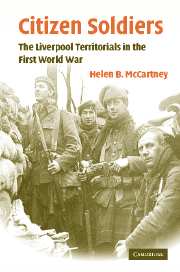Book contents
- Frontmatter
- Contents
- List of figures
- List of maps
- List of tables
- Acknowledgements
- List of abbreviations
- 1 Introduction
- 2 Pre-war Liverpool and the Territorial Force
- Part I Territorial characteristics and the morale of the soldier
- Part II Command, discipline and the citizen soldier
- Part III Attitudes and experience: the war and its aftermath
- 8 The experience of active service on the Western Front
- 9 The aftermath of war
- Bibliography
- Index
- Studies in the Social and Cultural History of Modern Warfare
9 - The aftermath of war
Published online by Cambridge University Press: 25 July 2009
- Frontmatter
- Contents
- List of figures
- List of maps
- List of tables
- Acknowledgements
- List of abbreviations
- 1 Introduction
- 2 Pre-war Liverpool and the Territorial Force
- Part I Territorial characteristics and the morale of the soldier
- Part II Command, discipline and the citizen soldier
- Part III Attitudes and experience: the war and its aftermath
- 8 The experience of active service on the Western Front
- 9 The aftermath of war
- Bibliography
- Index
- Studies in the Social and Cultural History of Modern Warfare
Summary
‘In a few days time I shall be demobilized’, wrote Frank MacDonald of the Liverpool Scottish; ‘I wonder how I shall take to civilian life again.’ The Territorial soldiers had fought for and longed for their homes and families throughout the miserable years of war, but there were few who viewed their demobilization without some trepidation. And these were the lucky ones. For other, less fortunate Territorials, returned prematurely to their families with the physical and mental scars of war, the task of picking up the threads of their pre-war lives proved a still more daunting prospect.
And yet, assimilating back into civilian life proved easier than many had imagined. The post-war story of how some of the Liverpool Territorials coped with civilian life and the legacy of the Great War serves to reinforce the main themes that have emerged throughout this book. The majority of soldiers had remained stubbornly civilian in outlook for the duration of their service. Civilian culture had been exported to France and used by the soldiers to shape their environment and bolster morale. They had maintained their links with family and community tenaciously, and their hopes and aspirations had always been firmly located in the civilian sphere. Survivors undoubtedly had to make some adjustments on their return, but their values, prejudices and modes of thinking had not been radically altered by the experience of the army, facilitating a relatively smooth reintegration into civilian society.
- Type
- Chapter
- Information
- Citizen SoldiersThe Liverpool Territorials in the First World War, pp. 242 - 257Publisher: Cambridge University PressPrint publication year: 2005



